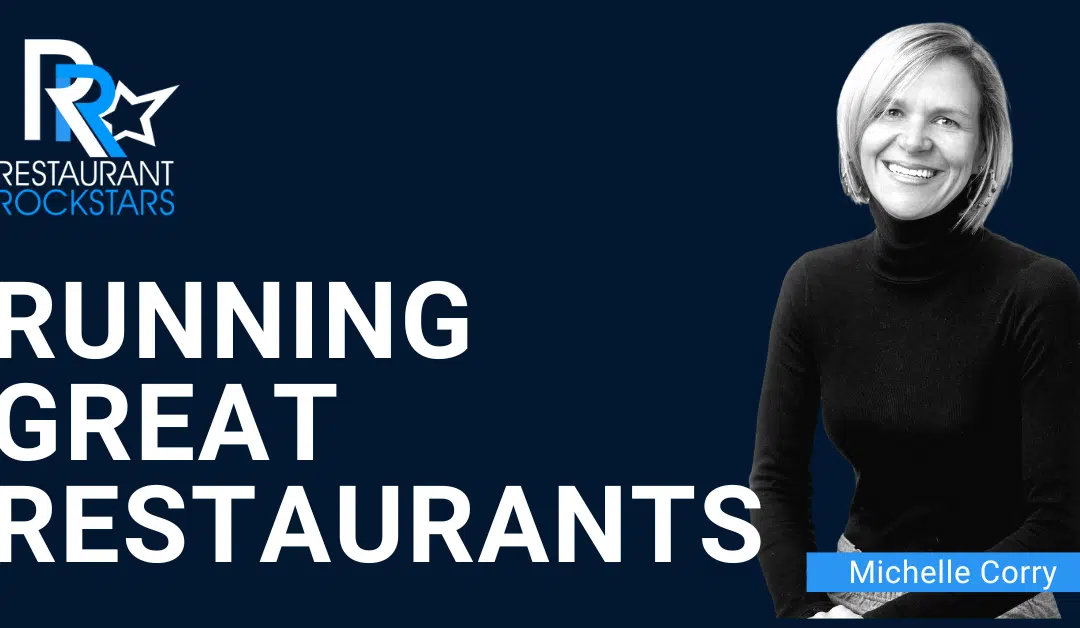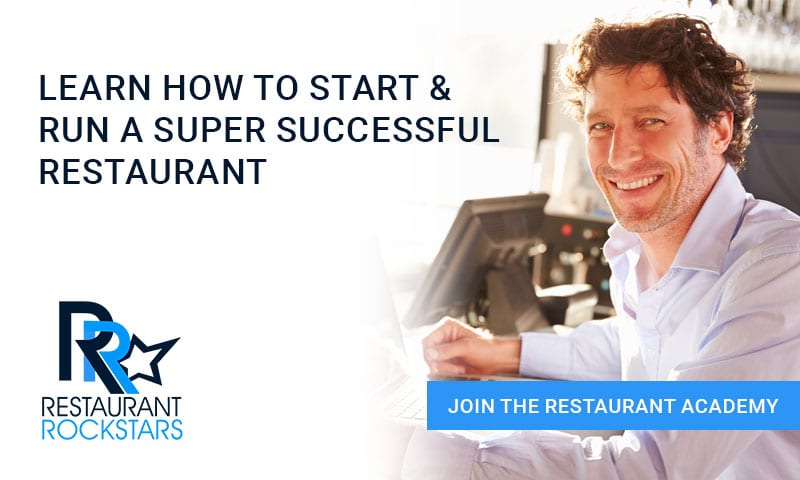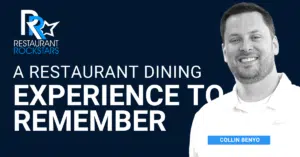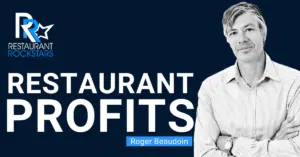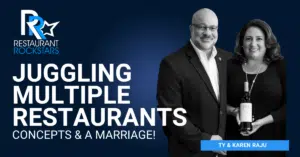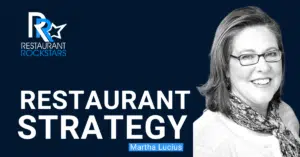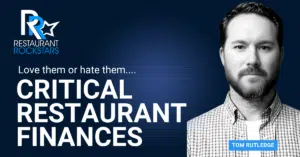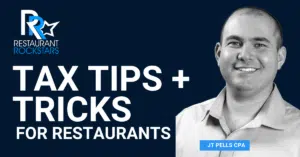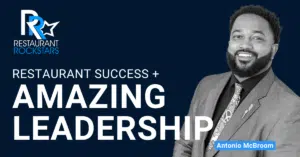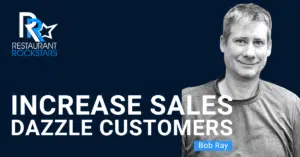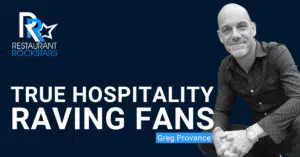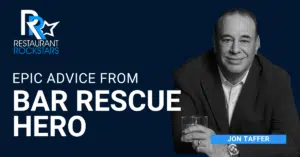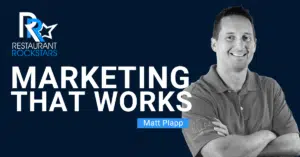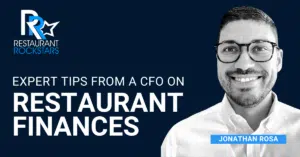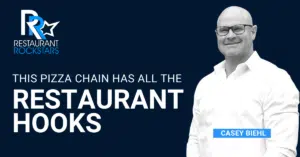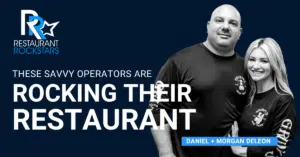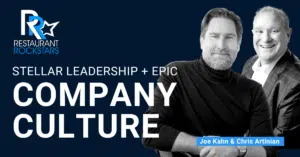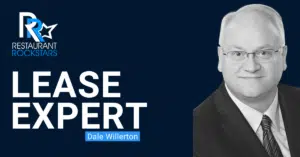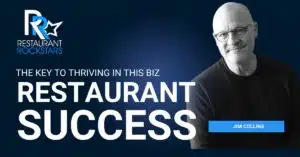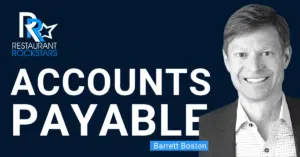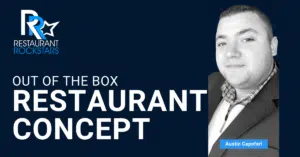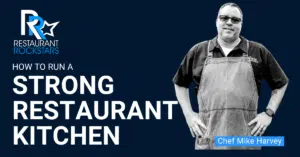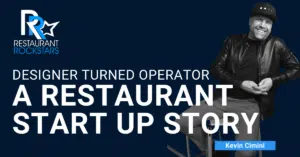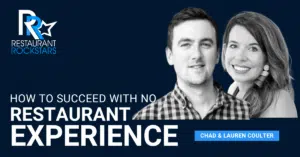Restaurant Rockstars Episode 335
How to Run Great Restaurants
LISTEN HERE OR ON YOUR FAVORITE PODCAST PLAYER
Click the video below.
There is a magic formula to running a great restaurant. For some this comes easy, for others it’s elusive.
What makes a truly great restaurant – one with long-time staff, great food & vibe, and most importantly happy repeat guests?
Well, find out in this episode of the Restaurant Rockstars Podcast. I’m speaking with Michelle Corry who has a true passion for great restaurants. She cut her teeth under a master at “The French Laundry”, one of the world’s most illustrious. Michelle along with her husband, chef & partner has taken that critical foundation, her own talents and inspiration to create truly great restaurants in one of the country’s biggest and most competitive “foodie” towns, Petite Jacqueline & 555 North.
Listen as Michelle shares:
- Key-learnings under world renowned restaurateur Thomas Keller
- Establishing a new foothold amongst well-established restaurants
- How her grandmother and travels to France inspired her bistrot
- The difficult decision to close her long-time first restaurant and then re-imagining it many years later.
- Working effectively with a spouse and outside partner
- Effective staff training in wine and menu knowledge
And of course, all the challenges and pain points of running a great restaurant today.
Watch or Listen to this episode and then go out and ROCK your Restaurant!
Roger
Connect with our guest:
@bistropj
@555_north
someone that wants to learn, they have to want to learn because it’s a lot of work to work for us. It’s work in our restaurants. Anyone will tell you, I think they’ll tell you it’s a good experience. But I think they’ll tell you, it’s a lot of work. You know, they can work in some of the best restaurants in the country with that skill, you know, are the world’s really, this is absolutely true. This is a business where you need no formal education, you can travel the world and you can rise to the top. You can own your own restaurant someday without a formal education. And it’s all really about how you apply yourself, what you learn along the way, and how much you put into it, obviously, is what you get out of it.
Welcome back to the podcast. Thanks so much for joining us. This week, I’m speaking with a true operators operator running a restaurant in arguably one of the most competitive foodie towns in America. That would be Portland, Maine, second only to San Francisco, California. What really struck me was her early experience and learnings came at Thomas Keller’s the French Laundry in California. Now that restaurant needs no introduction. She and her husband chef partner have you know turn this learnings and their experience into their own French bistro, in addition to reimagining a restaurant they had many many years ago in another location just north of Portland. And that restaurant is gaining five star rave reviews. So many key learnings nuggets of information here all about running great restaurants, so please, you’re not gonna want to miss it. Thanks to the sponsors of this week’s episode Whirks, Popmenu, Smithfield Culinary and the Restaurant Rockstars Academy. If you haven’t heard of the academy, it’s really what I call an exit strategy for your business. You can now assign your front end back of house teams to literally learn to run your business. The back of house can learn an inventory system costing out your menu, your food, beverage and labor cost daily breakeven and maximizing your profit while the front of house can use our sales stars training to learn to provide great dining experiences while doubling your sales. The academy is now available at a really reasonable monthly price. It’s available at restaurant rockstars.com. Can’t wait to see you in this week’s episode, so please stay tuned.
You’re tuned in to the restaurant rockstars podcast powerful ideas to rock your restaurant. Here’s your host Roger Beaudoin.
At Smithfield, they know that to meat lovers, a great serving of their favorite cut is so much more than just food. It’s an experience, one that keeps them coming back to your operation again and again. They’re committed to offering you the perfect protein for every dish at each day part turned to Smithfield for the most comprehensive portfolio of pork products, such as bacon, ham, sausage, and more. Plus a variety of fully cooked beef and chicken. With Smithfield products, you can create delicious meals from traditional menu items to globally inspired dishes, all designed to satisfy the insatiable appetites of your hungry carnivorous patrons. What’s more, Smithfield does it responsibly with full transparency and traceability from their farms to your kitchen. You can always be confident that when you partner with Smithfield, you will serve what you love and your customers will love you serve. Find your perfect protein with Smithfield for more information or to order products visit https://smithfieldculinary.com/smithfield
rockstars restaurants have been hit hard the last few years which means restaurant owners and staff are working harder than ever. Trying to meet the demands of in person hospitality can be really demanding, which is why I recommend popmenu answering popmenu answering turns every phone call into an opportunity. It uses artificial intelligence to answer the simple questions that are tying up your phone lines like can I make a reservation or where are you located, and over 50% of restaurant guests are happy to have their questions answered by an automated system. Within the popmenu platform you can customize answers for your restaurant and choose the voice your guests here, and even send follow up links via text message. Popmenu answering picks up your phone 24/7 365 days a year allowing you and your team to focus on what matters most pleasing your guests, prevent lost customers and impress your guests with popmenu answering. And for a limited time my listeners can get $100 off their first month plus lock in one unchanging monthly rate at popmenu.com/rockstars go now to get $100 off your first month and learn more about popmenu’s full collection of tools at popmenu.com/rockstars rock on
Hey everyone, welcome back to the restaurant rockstars podcast. Michelle How you doing today?
Good Roger, how are you?
So excited to have you on the show. So you and I know each other, we both are serving on the board of directors for our state Restaurant and Lodging Association, hospitality, main. That’s how we first met. But I’m really inspired with the restaurants that you’re running right now. And they’re very inspired properties. And we both share a passion for guests service and all things, pride and passion to the restaurant business. So that’s why I had you on today. And I know you’ve got a lot to share to the audience. So thanks for being here.
Thanks for having me. I appreciate it.
Absolutely. So we normally start my audience always knows that I start with the hospitality backstory of my guests, and everyone has a different story. What’s yours?
Well, you know, I don’t know when I decided at both my parents are physicians, so totally outside of, you know, everyone’s comfort zone. But I did know going into college, that’s what I wanted to do. I went to BU for hospitality, management. So I have my BS in Hospitality Management at BU. So I sort of know, knew right away, but there’s really, there’s family, there’s no prior experience. So I really can’t tell you how or why I knew that I just decided when I was 18, that that’s what I want to do. And I sort of never looked back. So let’s go back to be you. So if you’re in a hospitality program, what was some of the core curriculum or courses that you know, that you really got immersed in? And what did you learn from them? And did you apply any of those those to your businesses today?
Yeah, it was a terrific program. It was a very small program in a very large school. So I had some of the professors over and over and over, you know, the first two years were, you know, to be asked which science and math wasn’t my strong suit, but there was a lot of psychology, there was a lot of there was a lot of math, there was accounting, then, then there was a lot of philosophical and a lot of case studies, which was really, really helpful.
Yeah, and I loved it. It was really great real world experience. There was some cooking classes as well. So it’s a little bit of everything, a little bit of wine.
So I think it was just such a well rounded, fascinating program. Did that program specialize between restaurants and lodging operations at all? Or? Or did you sort of take courses in both because at that point, some people don’t know which area they might end up in. You took courses in both and there was an externship semester, which I actually did in a hotel, the Boston Harbor Hotel.
Some property.
Yeah, it’s a great property. And it was an amazing experience. I went through every single department, and worked a summer and every single department in that hotel. So originally, I kind of geared towards hotels and then then switched.
So we all have our own definition of what that word hospitality means. Can you share what it means to you?
Yeah, I think what I try to tell my staff now too, is that word to me means a lot of empathy. I think that’s extremely important, whether you’re talking about your co workers or your customers, to understand where they’re coming from. And that’s the only way to, you know, give them a great experience. And I think it’s, you know, personal, I think it means just making people feel welcome and comfortable, you know, and not differentiated as a job. But like, how would you do that if you were at home entertaining, or, you know, if you were your family if your mom was coming to dinner, just a welcoming, feeling. But I think that really starts with empathy.
All right, that’s beautiful for sure. So let’s now talk about anything that you like to do. If you have any spare time outside of your restaurant location. Do you have any other passions or things you’d like to do?
I mean, I am learning to do a lot of things. I’m learning to try to have free time. I think this is the first time in 20 years that I’ve actually started to step back a little bit. So this is sort of all new. I’ve have all these new hobbies. I’m teaching myself how to knit and I’m teaching myself how to surf. So and then I’m a big skier. I have 13, a 13 year old and a 15 year old, they’re both boys. So my husband and I are trying to spend as much time with them as possible before they go off to school. So we’re sort of focused on traveling with them and showing them a good time and spending a lot of family time.
Boy the skiing is fantastic right now. It’s yeah, that was the time to be out there. So if you can find the time good for you. That’s great. Fantastic. Well, you have to well, you’ve got one really beautiful French inspired restaurant petite Jacqueline, and I want to hear you know what, what was originally inspiring that it has something to do with your grandmother, I believe. So I want to get into that. And then I want you to describe the restaurant for our audience and tell us you know, if you were to walk through the door for the very first time, not as an owner, but as a guest, what are the impressions, what strikes you? What’s the ambiance like the menu, the cuisine, just take us through the whole concept but start really with your inspiration and your grandmother story.
Sure, so Jacqueline is my grandmother. And she is in fact, petite. She never got taller than four, eight. So yeah, perfect homage to her. But in even though her stature was small, she just filled up the room. She had a huge personality. She is French, my father was French, he moved here in his 20s.
So I grew up in a French household, I grew up going to France every summer, spending a chunk of time with my grandparents. And they would come over here for a chunk of time. So we were quite close. And then when I married my husband, my grandmother and him would cook together. And she was just all about cooking. And you know, you said hospitality. Actually, when I think of hospitality, she comes to mind immediately. She just embodied everything that was hospitality, just wanting people to have fun conversation, you know, getting to know people making sure they were happy that that’s what she lived for. So we wanted to recreate that in a very traditional French restaurant. But also embody that feeling of hospitality and conveyable atmosphere, it’s, you know, you walk in, and there’s a little bit of a din, it’s people enjoying themselves drinking, maybe a little too much wine. We really wanted a bistro field. So it’s not fine dining. It’s the idea when you’re in France, that you go to a bistro, for breakfast, for lunch, for snack for coffee for dinner for late night drinks. So it’s just open all the time. It’s a comfortable place. And I think when you go in, and I hope it’s what I feel what I’ve heard, and what we tried to capture is you’re like walking into Paris, you’re walking through, you’re in a different place. And when you walk through that door, you’re no longer in Portland, Maine, you’re you are in Paris, and it I think it feels that way. Hopefully it feels that way. I’ve heard it feels that way. But that’s the concept. From the way it sounds from the way it looks. We have pictures of my grandmother, and have our fair old pictures black and white of our family on the walls and maps of France. There’s some really cool lighting chandeliers, we keep the lighting dim at night, that’s super important to me. Some French music. And my staff, you know, I love my staff there. They just, they most of them have been with me for a really long time. And they are just they care so much about the customer. And the restaurant there they are really invested. And I think you feel that right away.
Do they all wear black and white, traditional French, you know, uniforms, call them what you will.
We started that way. Service, all that sort of thing. We started with the the vest we did start when we first opened with the vest and the the black vest and the white. Sure. And then I think it felt formal for maine. So we’re now yeah, we’re now in all black. But they do have striped aprons, long aprons. So I feel like we’re still holding on a little bit. Feel a little more casual.
Wow. So your grandmother obviously would be incredibly proud if she had the opportunity to dine in this restaurant. Was she alive when you started it at all?
She was she came, came to the restaurant when it first opened and we had a party for her and we toasted her and she did a little speech. Yep. So she has she’s no longer with us. But she did get to see it.
So oh, how honored she must have been I mean, her namesake restaurant and the whole story behind it. And just the history that goes with that that’s beautiful. I mean that that really, that really cuts to the core of what the business is all about, you know, having an inspiration and having a concept in mind and then creating it so that the guests can enjoy it and understand it and just be part of it. And and it sounds like from what you described, you’re transporting, you know, you’re transporting people to a whole different place when they when they walk in the door. You know, people go out to dinner for a variety of reasons. Sometimes it’s a special occasion. Sometimes they just didn’t feel like cooking. But a wonderful restaurant really transports you and makes you forget about what happened the minute before you walk through the door and now suddenly, you’re in this whole different atmosphere. And you’re really recreating that, that spirit and that feeling of France. So that’s awesome. You know, not everyone listening to this podcast knows what a foodie city Portland Maine really is. And so many people compare it per capita to like a San Francisco because not only can you find any cuisine or any concept, but there’s so many James Beard award winning restaurants. And there’s so many just it’s such a foodie scene. So when you first established the restaurant, can you recall well first of all, what year was that? Would you say?
So we opened 555 and 2003 and we opened Petit Jaqueline in 2011.
Okay, so it’s been quite some time. So being inside such a competitive marketplace? How did you gain a foothold? How did you get, you know, gain your first guest counts? And all that sort of thing? How did you build a loyal following? Tell us about some of those things. There’s so many key learnings there.
Yeah, so it was a big learning curve, we moved here in 2000, and opened 585 and 2003. And there wasn’t really a whole lot around one of our inspirations, we had been a bunch to forestry, you know, and that was one of the original me loved it. And that sort of gave us the confidence that if that restaurant could survive, assign, if we could, we could certainly bring some higher, elevated food to Portland, we were coming here from California. So we, but we were in Congress Street.
So at that time, 2003 was, Congress Stree, it was a little sketchy to say the least.
Yeah, yes, I think a lot of people thought we were a little bit crazy, but we got a really good price on the building, and we didn’t have a lot of money. So we thought we’re gonna go for it.
But what surprised us is how quickly people really supported us, even though no one knew who we were. And but it really, we started off simply trying to, you know, we wanted the customer to dictate, ultimately what we were serving, how daring could we be, you know, so we started quietly and simply and then we would experiment with some a little fancier meals or a little, you know, out of the normal realm of dishes. And if that went, well, we would continue. And so that’s how we plotted through and the customers told us what worked and didn’t work. And we were super, I’d say focused on the customer. On repeat customers on loyal customers, we’d learn what they liked, where they like to sit. And so we just started getting a following. And people would come back every week, or, you know, once a month, and we saw people think of it now because it was like 18 years ago, we saw people coming with babies and their kids are now in college. It was crazy. Because they would come in once a week. So you’d see them and so we really focused so even though Portland, obviously, it’s a tourist scene, and we love the tourists as well. But we our thought process was to focus on the locals, because that would sustain you through the winter. And that was, you know, ultimately what I think we became known for.
Yeah, and obviously, you became the front of house personality, kind of the maitre d, you know, and you definitely have a presence in a restaurant, would you say, No, your husband, Steve is the chef at the restaurants. And one, he’s probably very creative. I guess he’s experimental. Right? He was willing to listen to feedback from guests. And obviously, changing a menu just fuels his fire and his passion for what he’s doing, too. So does he ever come out and greet the guests and talk to them? Does anyone say, Hey, can we say a word with a chef, we’d really like to compliment him on the meal, that sort of thing. Does that happen?
Yeah, he does. He’s actually he’ll say that he is kind of shy, but he’s not. He’s Irish. So he’s, uh, he has a gift for the gab. So the only reason he won’t come out is because he gets stuck talking for too long. Then fires happened in the kitchen. But he does. Let’s come out. He loves talking to the customers. And again, he’s just there for too long. Here’s the problem. Where’s my problem? I think it’s a problem. It’s hard to get him back into the kitchen.
What would you say, you know, we all visit restaurants from time to time when we’re traveling or even locally, or whatnot. But you know, it’s clear when a restaurant is firing on all cylinders, you can tell that the operation is dialed in, then you can also tell those restaurants that are just sort of your walk in the door. And it’s just chaos. And I’m not talking about the labor crisis now, which clearly is affecting everyone. And we haven’t been able to deliver the same level of service that guests have come to expect since the pandemic but let’s take ourselves before the pandemic. What do you believe in your heart of hearts and mind is sort of the magic formula of a great restaurant.
Wow, that’s a that’s a doozy of a question.
Well, I think you know, it’s a fine line, right? You don’t want I want everything to be slow and quiet and dull. And you want this feeling that things are a little bit hurt people loved watching, you know, five to five was big, open concept and people loved watching people moving fast and knowing that it was busy and full and like you said operating at full cylinders, but there’s a fine line between it being a cool busy atmosphere to it being complete chaos and everything’s on fire. Right.
I think that’s a really hard question. You know, a lot of it is chemistry between your staff for sure. For us, because my husband worked in the back and I worked the front, we created an atmosphere that the front and the back work together. We didn’t tolerate any unkindness or blame game or yelling, we didn’t, you know, my husband is very calm. He isn’t the screaming, Chef,
I’ve had a couple of those, by the way.
Oh, days gone by, so it was, now you know, because you can’t have your staff be nervous to talk to you and tell you when there’s a problem, right, then doesn’t work. So I think we did the philosophy of everything’s fixable. You know, this is an emergency, we’re not, we’re not This is an emergency room. It’s just dinner. We can, it’s important, but it’s not, you know, life threatening most of the time. So I think there was a feeling of calmness back in the back of the house, and a feeling of unity between the back and the front, which was, you know, we’re a team and if something goes down, we’ll fix it together.
I think it’s a really hard business, that the owner isn’t there, you know, most businesses, you can operate without the owner having a presence. And I think that’s a big stake in this business. I think it’s an you know, we’re trying to do it more and more, because we’re getting old. But it’s hard to be there, you know, weekends and nights all the time. But I think that is probably the magic that at least if you’re not there every night, your presence is still there, it’s not one of those things, you can sort of set it and forget it and check in I just don’t think it really works. I mean, maybe if you have, if you do do that, you have to have a manager that is in it. 1,000% And not just in it for the paycheck, but in it as much as you and then you have to be guiding them through that. And you know, your philosophies and so forth. Absolutely true and excellent advice. So let’s talk a little bit about well, a lot of the audience have owned restaurants, they still own restaurants, maybe a single independent location, multiple locations, some people are into franchising. But regardless of all of that, you know, we’ve all had successes, we’ve had failures, we’ve had experiments and all those things.
Now, you mentioned 555, that was the original 555 That you said, opened in 2003. But now you’ve got a new 555 North, we’re gonna get into that in a few minutes. But can you tell us a little bit about what happened at the original 555 and why you chose to close? Sure. So it was 18 years.
And I think you know, segues from what I said, you know, when we opened it, we were there. We lived there, the first two years in an apartment above the restaurant, so we were literally there 24/7.
And then we had kids.
And for a while that still worked, you know, but then things started to get, you know, the kids go to school and you’re you’re not seeing them for 24 hours, because you’re sleeping in and the other ones putting on the bus at seven in the morning and you’re not getting home, the nanny puts them to bed and you’re just not. It’s, you know, this isn’t the way it should be right? So you’re trying to figure out a solution. Our solution at the time was that Steve would take a step back. So he hired a chef. And then it just as the kids were getting older, it was getting tougher, and we decided if we couldn’t be there 24/7 Like I said to you, I don’t think it works as well. And we weren’t putting out a product that we felt was the product that we that we had envisioned. And we couldn’t be there to greet those regulars that had been with us for 18 years. And you know, we had some great staff, but it was just time to, you know, look in another direction a little bit and spend some time with their family and, you know, maybe look at new ventures because I think when you’re running a place like that, it’s a unique place, because it was fine dining, and it was a pretty big restaurant, etc. So it just was all encompassing, there were tasting menus, and there was a separate bar and a bar menu. And it was just, it just needed a lot of attention. And since we couldn’t give it the full attention, we thought it was best to take a break.
You know, one of the biggest challenge and I know personally from experience that it’s it’s definitely one of the most difficult businesses but then you combine working with a spouse, which can be really, really challenging too. Can you talk? Can you speak to that? What it’s like working together with Steve,
you know, we’ve gotten asked that a lot and a lot of people come up to us and second never worked with my spouse. But I really would say that I would I would find it difficult not to work with my spouse. But of course that’s sort of all I know. But um, I think people don’t realize that we didn’t you know, he was the kitchen. I was front of the house. I worked in an office and the day and then out on the floor and he was in the kitchen the whole time. So we didn’t see it’s not like we were next to each other all day. We were in separate departments so to speak. So that made it a little easier. And we’ve always had the same vision. We were lucky that there was very few things that we didn’t agree on. So that helps. And like my husband I’m very calm and super patient. And I think the ultimate philosophy is much like raising kids. Even if you don’t agree, at the time, you present a united front for the time being, and then you just maybe discuss it later and come up with a decision. But in the heat of the moment, you back each other up no matter what. And I think that was key. We can respect each other so that people can see you respecting one another is huge to know.
Is it hard not to bring the restaurants and restaurant conversation home when you have free time?
Oh, yeah, that’s all we talked about. And it’s funny because our kids laugh, because it will get super. When we agree together, whether we’re frustrated with a situation or a customer, or what have you, we’ll get heated in our agreement, and our kids will laugh and say, it’s almost sounds like you’re arguing but you’re actually agreeing. So funny. Yeah. I, my son, my oldest son says, I’m not I’m not doing I’m not going into business. It’s too stressful.
You know, that was my next question. Do they have any involvement at all in the restaurants?
They do! So my oldest at 13 with when the pandemic hit, and we were short staffed, he started working at petite check lane. He was back server and dishwasher. And he works there. Yeah, so he’s worked in for the past two years. And then he works down the street at another restaurant, washing dishes and back serving and my 13. My 13 year old now just started working so he’ll start dishwashing this summer at Petite Jacqueline, yep.
restaurant owners and managers. Listen, it’s not too late to claim your employer retention credit. But you have to act soon. If you haven’t heard of this, your business can receive money back from the IRS money have already paid in payroll taxes. Nothing you do today is more important. Now this is free and clear cash that your business is owed by the government that ERC program is available, if your operation had 500 employees or less, you had to shut down or partially suspend your business, or you had at least a 20% decrease in business due to COVID 19. During any quarter of 2020 and the first three quarters of 2021. Now your business can get up to $7,000 per employee per quarter for 21 and up to $5,000 per employee in 2020. Now, if you have just 10 employees today and meet the requirements, you can receive up to $260,000 back in a refundable tax credit that you don’t have to pay back. Now the faster you apply, the quicker you get the money, but you must do it soon. You can use the money for any purpose payroll cost of goods, business improvement or other expenses. Again, you don’t have to pay this money back now works is a company that will do everything for you to get the money that you’re owed. Now I’m speaking from experience with Whirks. My restaurant received big checks in all available quarters and Whirks people and process made it easy. For a no obligation consultation, click the link in the show notes to this episode and speak to them with no obligation. You pay nothing until they get you the cash app now.
So interestingly, well, I my very first job in the restaurant business was a dishwasher as a teenager too. But it’s a little too early to tell. But you’re creating a lasting legacy here with your businesses, and there may be a chance that they could take over someday, right. Who’s to say?
Right? I mean, it doesn’t necessarily matter to as my my youngest. He used to say he wouldn’t, but he’s started cooking lately. And he seems to love it. So lately he’s been like, maybe we’ll see.
Let’s get into the menu. Now obviously, creativity is a big part. How often do you change the menu at petite?
We change it a big changes seasonally. So big changes four times a year. But we we change it quite a bit depending on things that are working or not working. We give the chef at their now a ton of leeway to sort of do what, what they think they want to do, which is totally fine with us. As long as it works. You know, we like empowering them to do their thing. They think it’s important is really important. I find for the cooks, that the menu changes a bit so that they have some creative input and some challenges. Because if you’re just cooking the same thing day after day gets boring for them.
Yeah, of course. So would you say that you encourage them to come up with new ideas at all your cooks?
Yep. Yeah, mostly we sort of look at it as a veto process more than they come up with the ideas and if we don’t think it fits, we’ll we’ll discuss it and tweak it, you know? Yeah.
Okay, perfect. That’s great. Now do you collaborate on the menu as well? Do you come up with wine pairings for the food you strike me as a somewhat of a wine expert, are you?
Yes, yes. So I do the wine parents, my manager Jake at petite, Jacqueline does a really great job. So we will collaborate. And then I do just about everything of 555 North and the wine pairings, we do a lot of wine parents, and you know, we’re trying to teach the servers to be able to do their own wine pairings, you know. So there’s a lot of teaching involved.
And then I do I do collaborate on almost everything, you know, after you’ve been doing this for 20 years, you sort of have an insight of what the customers will like and what they won’t like, what will be, maybe to elevate it, or what will be too boring or what you know that the cooks, it’ll be too difficult in the night you’re doing too under covers, you know, they always want to do these fun things. But you’re like, well, that’s fine when you’re doing 20 covers, but we’re doing 200 Not gonna work. So there’s a lot of collaboration, and which I just think is teaching teaching these young chefs, you know, there’s more to being a chef than cooking.
Is there anything that you can recall that you thought was a really great idea? Maybe was an experiment that just didn’t work out?
That’s a good question. I’m sure there’s tons of stuff. Of course, you know, you’ve been in the business so long. It’s like not everything is a grand slam home run. And we try this under the best of intentions, but it doesn’t always go great. Yeah, I mean, I think a lot of them are desserts. You know, I think a lot of desserts, it’s a struggle, what people’s personal tastes are super interesting. And that’s often again, a problem when you’re, you know, I think the answer to that would be what we said earlier is that, you know, the best laid plans again, things were great when you’re doing a tasting menu for 10 people, but then when you try to extrapolate it for on a Saturday night with 200, covers, it fails miserably
doesn’t want to do the souffles, right, that take time,
you’ve got them doing souffles now, and they’re working out really good, you just need a little they have to pre order. But yeah, that’s one that we didn’t think would work that’s actually working. So that’s kind of fun. Yeah, so that’s not a failed experiment at all. As the opposite. That’s kind of a cool one that is gonna, I think kind of work. We’re just experimenting with it now. So I mean, the problem is, you don’t have a ton of time to experiment, we, you know, like you said, we’re all Mom and Pop operators, and we don’t have an extra kitchen and an extra set of hands, I can prep things and try 10 Different varieties, and we can sit there and taste tested. And you know, you’re sort of running everything on the fly and, you know, waiting to see if it works or not, you know, so absolutely. Yeah.
Thanks for that answer. Let’s, let’s quickly shift back to the most challenging time in this business. And everyone went through it, what was the pandemic like for you?
Yeah, the pandemic? Yeah, you know, it is what it is. I think, for us, I think, you know, I think about this a lot, and the whole, my peers or industry and all the, you know, owners, I just when I think back that time, I’m just so proud of everyone, all of us. It sounds probably corny, but I just think more than anything, it shows you what a strong, intelligent people that are super impressive. And I think at the end of the day, that’s what everyone did, including the city, and including the State. I mean, everyone just worked together to no one quit. No one said, I can’t do it anymore. You know, it was okay, let’s do to go alcohol. Let’s switch to go dining, you know, central provisions did sandwiches, and yeah, we did our menu, and then we were able to have a huge outdoor seating, because the city allowed it and that was that saved us. So you know, you know? Yes, right? was a dark time necessarily look on it as we were able to pay all our employees, I work together with several different restaurant owners, if we were texting and emailing every day saying, What are you doing? Do you have you heard from the unemployment? You know, it was just, I actually look on it as a time where I’m pretty proud of everybody and how we pivoted and, you know, kept our staff paid and informed and, and then moved on.
Well, we don’t need to dive any deeper into that. But thank you for sharing your experiences. Everyone had to pivot numerous times. And it was obviously the biggest challenge. I can’t imagine anything going through that again, now that it’s over. Do you feel stronger now for the experience as a business and a person?
I think so I I have a better understanding of how precarious everything is. I mean, I feel fortunate because we’re sort of towards the end of our career. And it wasn’t as scary for us because if if let’s say we couldn’t open you know, we We sort of prepared for that. Now we’re, we’re almost almost there anyway, I think it was extremely hard for younger, younger generations of new restaurant owners. And, gosh, that is so hard if you’re just starting out your life and your career. So yeah, I mean, I feel really great. Our staff worked really well. And I’ve kept a lot of them. And I mean, like you said, as much as we don’t want to talk about I think right now, it’s almost harder than the pandemic, to be completely honest with you.
What we’re going through now is probably more challenging, or at least as challenging.
Let’s touch on that. That really was my next question. What are you finding are to be the biggest challenges and pain points now? Obviously, labor and rising food costs and all those crazy things we can we can certainly get into that. But what’s keeping you up at night? Or what’s really the biggest? I can’t get…I can’t seem to get this out of my head, because it’s really a big challenge.
Yeah, I mean, I think nobody wants to hear it. So redundant and repetitive. But in labor, I mean, I’ve been doing this for 20 years in this town and labor has always been tricky, you know, it’s main and there’s not a lot of humans here, period. So staffing and skilled staffing has always been a challenge. But now more than ever, it’s just, it’s crippling, it’s crippling, I, you know, we cannot retain people, no matter what you pay them. And some of the politics has been, you just feel like, you know, you’re getting squeezed from every end. And being a mom and pop, I think there’s a lack of understanding from people that what it means to own a restaurant, the thin profit margins, and just the the mom and pop, you know, we’re, we’re not a commercially owned huge conglomerate, franchise, restaurants, we’re just couples trying to, you know, run a restaurant and make a living, and not a huge living just enough to, you know, put our kids in college and, you know, not work toward 90 type of living so.
So everything you shave is just, it’s just navigating one thing after another, whether it’s, I don’t want to get political, but you know, whether minimum wage keeps rising, and, you know, your, your, you know, paid sick, the, you know, all these things, you just take more money off the top, and you’re just trying to figure out a way to do it without charging money that your customers cannot or will not pay, you know, yeah, the value proposition is lost. At some point, you can’t continue to raise prices, where people no longer see the value in it. And that’s probably one of the biggest challenges because obviously, we talked about rising food costs, there are certain things beyond your control, you can, you know, work with your suppliers as best you can, you can shop things around. But at the end of the day, we’re still seeing much higher prices than what we were used to paying. And some things are like really out of control that have skyrocketed. So you know, you have to shift your menu, you have to drop items, you have to explain communication to the guest is critically important. They need to understand that these are the times and everyone’s experiencing inflation in their own way. But when they go out to dinner, they don’t necessarily think about that. They just want to have a wonderful experience, but they still want to feel like they’re getting value for what they’re paying for. That’s, that’s hard. Yeah. And as you raise prices, the expectation is just higher, which I get, I totally agree. But there’s only so much food you can put on the plate for that price. And and then you’re short staffed. Your service isn’t quite where it should be. And so they’re feeling Yeah, they’re feeling they’ve been in get the value for that raised price, which is totally fair. But it’s, you know, yeah, at some point, the graph has to meet, right, the two points have to meet.
So you’ve got a core staff that have been with you for quite some time and the people that you really rely on, and then obviously, you try to hire whenever you can, what would you say? Your training is like, say on a daily or weekly basis? Because training is in the guest service experience is so important in your restaurants. Can you just sort of take us through, say, onboarding, and training and what types of things that you’re training them on, and hospitality and proper etiquette at the tables and just interaction with guests. I mean, all these things are important, but what what do you do and how do you do it?
Yeah, I mean, training has always been so important for us, because we understand since we came here in 2003, we were introducing a type of service that was never really never seen here before coming from the French Laundry. I didn’t want to do the French Laundry in Maine, per se, but what I wanted to do was a little more casual atmosphere, but I wanted to have that service, because it’s so special. And I wanted the customer to feel special and to feel like they were being spoiled and being shown so something that they’ve never seen before. So you’re taking people that have great attitudes, that’s how we believe you know, someone that wants to learn, they have to want to learn, because it’s a lot of work to work for us and to work in our restaurants, anyone will tell you, I think they’ll tell you, it’s a good experience, but I think they’ll tell you, it’s a lot of work, it’s a lot of training, it’s a lot of studying, it’s, and when you’re done, that you’ll be rewarded, because you’ll be able to get a job anywhere, you know, and know what you’re doing and a level of service that is top top tiered. But again, with that comes a lot of work. So you really have to want to do the work.
So we love to take people that are interested in doing the work that are excited about doing the work, that have a great attitude that sort of have hospitality in there, even if they don’t know it, yet. They have hospitality in their, in their blood, and then teach them so we consider our restaurants, sort of teaching restaurants.
You know, we want people to learn the right way. And so, you know, experience isn’t always important to us, it’s more about, it’s so much easier. So you can teach them the right way. Because and teaching the wrong way, is tricky.
But you know, you have people coming from, you know, the pizza joint and moving into fine dining, which is fine, it’s doable. It’s just it takes some training. So our training is pretty intense.
You know, because there’s wine training, and the menu changes, and they need to learn about the food. We have many meetings with the chef. We have long meetings right before service, so we can answer questions and talk about wine, you know, we do wine tastings.
You know, I would like a glass of Bordeaux right now. Right? Right?
We do. I mean, but you have to go back to the square one and show them exactly how to open a bottle of wine exactly right, because there’s 10 different things that they can do wrong, but you see everyday wrong. And so you know, it’s sort of an it’s a lot of repetition, and a lot of patience, because all I care is that people are trying and they care, and they will get there. And when they do, they’re pretty excited about it. When once they learn how to do it and realize that they can get, you know, they can work in some of the best restaurants in the country with that skill, you know, are the world really?
Yeah, this is absolutely true. This is a business where you need no formal education, you can travel the world, and you can rise to the top. You can own your own restaurant someday without a formal education. And it’s all really about how you apply yourself. What you learn along the way. And how much you put into it, obviously, is what you get out of it. Now, you mentioned earlier in this, California, and then you just mentioned the French Laundry. So I’m not putting the two together. Did you and your husband both work at the French Laundry.
I worked at the French Laundry and my husband worked at dimensioned on when it was a restaurant. Yeah, yes. Yeah. After he finished culinary school, we moved out there. Yeah. Now what that is an incredible, you know, just an influence alone. I mean, the French Laundry is internationally acclaimed. Now, was that a Thomas Keller property?
It was Yeah.
Okay. And did you work for Thomas?
I did. I worked when he was still there every every single day, right before? Right when they were beginning to the talks of opening per se.
No kidding.
Yeah.
So I can’t imagine what you learn there and how you now have applied that and continue to apply that. And it’s an it’s a story that you probably inspire your staff about, I mean, that is really an illustrious something to aspire to. And now you’re recreating a lot of that with your restaurants. And obviously, you’ve got your own influences in your own spin to your restaurants. But it’s like you came from a really amazing property that has, like I said, international acclaim. And I think just about everyone that’s listening, this podcast is familiar with, with the name Thomas Keller and the French Laundry, it’s just made such a splash. So I’m really glad you shared that. Thank you so much not to take anything away from what you know.
That was, that was the idea to go to the best restaurant, arguably in the world and learn from it and then you know, see what you could could do from that. You know, once you learn from the best you can, you don’t have to do the same service. But you know, the right way is key to know the right way how to do everything. And I learned so much there. And I learned the biggest thing was hospitality, I’d say because even Thomas Keller and he was not easy to work with by any stretch of the imagination. I think yeah, that along the way.
Yes. Demanding high standards.
Yeah. Yeah, I got a real thick skin after that. But um, but But you know, as difficult as he was, I mean, difficult wrong, I guess as a perfectionist as we all are.
He really what impressed me the most was his hospitality has his how important the The clients, the guests, the customers were to him, he it just to everything is about making them happy. And he never rested on his laurels for that. And, you know, the kid, the culinary school kid that saved all his money to come in to eat was as important to him as the celebrity that came in and even more, he wouldn’t be IP them he would he would do that was really important to him. And each customer was really important to me. He was also a businessman, he, he understood the importance of filling seats and making money and that this was a, you know, that it had to make money. And so it was, it was really, it was a fantastic experience.
Thank you so much for sharing that. I’m inspired, just listening to it. Let’s shift gears a little bit. Michelle, let’s talk about 555 north. So you’ve reestablished the name. And now it’s, what 2025 miles north of Portland, Maine town called Brunswick, rather foodie town, there’s quite a few good restaurants there. It’s also the home of one of the greatest colleges around of course, Bowdoin College is up in Brunswick and all that. So let’s, let’s talk about the concept and where you’re at in the timeline of that restaurant and what’s happening now.
Sure, so, like you said, We’d close 555 And we were we were, you know, sort of, it was sad, but it was time. So it was, you know, we had a little bit of peace. And then we had a friend who was on the board as well come to us and say I’m bought a hotel, and I’m renovating it. And there’s a restaurant and I don’t know anything about restaurants. So you want to partner with us. And we thought about it. And we said, sure this was an opportunity to reopen 555. And, but you know, it wasn’t 100% ours, so we didn’t have to be there. 24/7 And we’d have a partner. So we did that. And his wife designed it. And it was it’s so beautiful. She did. It’s just an amazing, you know, when we opened 535, we did it all on our money, we didn’t even have an investor. So we painted ourselves, and we never had a designer. So to be able to do this was sort of a dream come true to have like a beautiful, beautiful space. And the hotel is beautiful. So yeah, and so it’s been, I want to say seven months. And it’s been, it’s been going great. It’s been very busy. We love Brunswick, I didn’t know it very well, but it’s a cute town. And customers have been great. And they’re actually, you know, more experimental than I even thought we thought, you know, it’s Northern, it’s not gonna be like Portland, and not true. They’re into food and wine. And it’s been a great experience.
We have some great staff that we found it was a little tricky, but we made it. So yeah.
Is Steve chef there as well?
So he’s when we consider the Executive Chef, you know, he doesn’t cook there, he mostly helps design the menu again, treating it as a teaching, we have a young chef that was actually the chef at Petit jacquelene that we moved over. So perfect row right? Young, and he’s learning and he’s very talented and very enthusiastic. So Steve’s helping guiding him with, you know, managing and managing a menu and how this works, because it’s a big restaurant. So it takes a lot to understand what works and doesn’t work like we spoke about before.
Well, it’s also a beautiful thing that you can find time and the care to mentor others in this business and bring them up and give them skills that they can then, you know, take with them in the future. Hopefully they stay with you for a long time. But ultimately, you know, they’ll spread their wings a little bit, but you can be so proud of what they accomplished in their careers just based on taking a personal interest. And I think that’s a huge part of our business. I know I was able to experience that for a couple of decades. And just finding someone that had that, that fire and that passion and they really had a desire to to learn and grow and they loved the business and you just wanted to share everything you knew with them whether they with you or not. It’s like you know, yes. And there’s something so gratifying about that.
So I’m sure you feel the same thing with the people.
Yeah, it’s so funny. We always joke but all the best ones do leave because they’re ambitious. And, you know, unfortunately, they go to do their own things. And we love that that’s a compliment, right? If they can go and be successful, and we have so many people that are used to work for us that own their own restaurants now are in the wine business. And yeah, we love it. You know, they’re like your kids. You want them to do well. And yeah,
so we didn’t talk about the concept in the menu at 555. Tell us about that.
So it’s almost identical to the original 555 We took or are taking the most signature dishes the most loved and iconic dishes that Steve came up with and They’re on the menu, and then we’re peppering them in with things that change. And seasonally, it’s very seasonal, and some of the new chef’s ideas and some of these ideas and, you know, you’re limited by your sort of, well, we say you’re limited by your lower lowest denominator, you know, everyone has to be able to cook this food. So you can’t come up with this crazy recipe that only the chef can do and recreate. So, you know, and again, teaching is part of it. So you have to have time. And the ability to teach this the staff, it’s a little greener stuff up north than in Portland. So you’re definitely doing a lot of teaching. And so that’s great.
What would you say? I believe your partner’s name is Gerard Is that correct? Yes. All right. Yes. Is he? What’s his role and responsibilities with the restaurant besides the hotel? Just what’s it? What’s he doing? He’s the owner and operational manager. He is, he’s so great. Because he knows hotels. So well, he worked at the Portland harbor. He was the general manager there for years and years.
But he really is interested in learning about restaurants. He’s very engaged. He’s very supportive. He listens to ideas, he gets feedback. But he’s he stays hands off knowing the limitations of his knowledge. But also, he learns a great deal. And he’s just a great, great partner.
We were nervous because Steve and I suddenly been us for 20 years, we haven’t even had sent an investor we haven’t had anyone to answer to. So we thought, how’s this gonna work? But it’s been great, you know, because it’s also a, someone who’s been in the industry for even longer than us. And we can bounce ideas off of him and learn from him as he learns from us. So it’s a great collaborative, overlapping strengths, but combined similar vision and great working relationships. I think that’s rare. But that’s wonderful that you found it. I think, we rolled the dice a little bit. And so there’s an experiment another when thats not a failed experiment, but a good one so far.
Great.
Yeah. Because I you know, as we’re doing it, I’m imagining God, this could have gone really bad if it if it wasn’t like that, you know, so. So we’re lucky. And he’s very patient, he is more than what he’s teaching me more than anything, is he’s so patient with the staff, I can sometimes be a little type A and I really, my expectations are quite high. And he reminds me that these people are learning and we’re here to teach them now. And it’s okay for them to make mistakes. And and it’s our responsibility to show them the right way. So, and he’s super patient, which I’m not necessarily the most patient person. So it’s a great reminder, for me.
Sounds like a great collaboration.
You mentioned earlier, something about being not only in the front of house, but also being in the back office. So you’re doing all the finances for these restaurants, too.
So for years, I did absolutely everything. But it really sort of took its toll. I know where and all right, all the all the bill pay, I mean, I still do all the bill paying, we do have a bookkeeper, that helps me a little bit more.
So that was a good thing.
And, and like I said, we are slowly trying to step back a little bit. So I do have my and I think that’s what you were saying part of the mentoring and teaching process is stepping back so that you can let your managers learn and do the tasks that you used to do so that they can learn to do it for their next job as well for you know, their adult life. So I am letting my general manager do a little more of the payroll stuff and the bills stuff. And so I and you know, then you switch to overseeing and double checking right versus the actual doing, but I’m still doing a lot.
But less each gradually, you’re taking things off your plate, no pun intended.
Yeah. Trying?
Yes.
Well, good. You know, there’s a great lesson to our audience there. And I’m shifting and I have shifted quite a while in the last couple of years of the terminology that I use, because the word manager is just so commonly used and the word delegate is so commonly used. But that doesn’t mean that just because someone has been promoted to manager, they have the title of manager that they’re actually competent or experienced or really, very well versed in what they do. And that’s the difference between a manager and a leader because the leader leads by example. They’ve got the experience. They’ve got the patience, and instead of delegating, telling somebody what to do they really empower those people and they recognize talent They give these people additional responsibilities that give them room to fail. They don’t criticize they, you know, they critique performance, they encourage the nurturer, they develop, and then they recognize and they reward that performance. And that’s really empowerment. Because your people feel like, I don’t want to let these people down. It’s like, I have talents. They encourage my ideas, they give me additional responsibility. And I’m thriving here. And so many people, you know, that’s sort of a key because most people have employees, and some people have empowered staff, and team members. And you know, I just think that’s a huge difference today. And it sounds like that’s the way that you know, you’re mentoring people, and you’re really bringing them up in your organization. And that is allowing you to take steps back when you feel comfortable, and you can’t be afraid to do that. And that’s kind of your exit strategy. If you’ve got that dream team in place, and if you can really get everybody so that they feel like they own the place and they run it like they own it, then they’ve got your back when you’re not there. And that is a very powerful system in a restaurant.
So yeah, and I love I love how you said it. I think there is a negative connotation about delegation, as you’re just dumping work on to somebody, you don’t actually do it. And that’s what I’m trying to how I teach my managers, I want them to delegate as well. But I look like that it’s not delegating. It’s empowering them because they want to learn and they want to do the work. And they can’t learn if they’re not doing it. So yeah, that’s a great point.
Yeah. And I do I have people at PJ that sort of, I look at them, and I’m like, You act like your own plates, you’re taking on so much. And you know, it’s amazing how certain people will take that on. And it’s not just, they’re not doing it for me, they’re doing it for their staff and their and the customers that they love, which is a great feeling to you know, you’d like to motivate them to not just be the reason that they’re motivated.
Absolutely true. You’ve given us so much information and so much valuable insights and nuggets about running great restaurants. I have a last question for you. What would you say? Well, we did talk about the pandemic being a huge challenge. But then you put another spin on it saying these are the most challenging times right now. And with that in mind, you’ve been able to dig deep and be really creative and really resourceful and keep your head on straight and just keep moving forward. What would be your best advice to other operators that have survived the pandemic? They’re struggling with the same challenges you are? And sometimes we feel like our bandwidth is shot and we’re at our wits end, but it’s like, what would you say to people that just keep going to continue to not just survive in this business, really find success and fulfillment and be really gratified in what they’re doing? What’s what’s your advice to them? How do you do it?
Well, I’d say you know, surround yourself with positive people surround yourself, really talk to your your peers and your colleagues. I know we’re so lucky, in Portland, and in Maine in general. And you know, from being on the Florida hospitality main, there’s just so many great people and resources, that are fighters that have great experience that have been doing it longer than you and are positive, always positive. And I think in Portland, I find all of our other restaurant owners are, were more like friends and supportive. You know, when new restaurants come we’re excited because we think it brings people to Maine and elevates all of Portland was very non competitive. It’s, you know, I, I talk almost every day to several restaurant owners in town and we just, we help each other I’ve got this great idea this is really worked for me. You know, my chef is ready to move on and he’s a great chef, he’s just ready to move on or do you need somebody you know, it’s just so important to surround yourself and with those people I think it’s important to remember that is just food and things can be fixed and you get one bad review and you just learn learn learn from everything learn from everything, you know, I learned from the pandemic and I’m I think a more relaxed person because a bit more relaxed manager and more relaxed leader because we learn from that and and that the quality of life, quality of life is really important. I spent 10 or 15 years really dug in deep and I’m I don’t regret that per se but I would say look around a little bit and look at the quality of life and the quality of life of your staff which I don’t think was as important to us back then. But as a leader now, giving your staff a quality of life and making sure they understand that is part of our our job description. So you know if you’re happy in your life, it shows in your restaurant. And just you know, try something new every you know every year my husband and I thought of something big that we would do to the restaurant whether it was change all the tables or we started tasting menu or we are If we redid the office into a private dining room, you know, I think every year you need to think of one big change and invest in it’s an investment you’ll have to put some money in. But it’s worth it makes the great staff it invigorates you, and usually it creates more, more opportunity and more money and more customers. Yeah.
That’s very solid advice. Michelle, thanks so much for sharing. Thank you for sharing your experiences and your insights and your wisdom of all things, restaurants, as well as talking about your two properties. So you’ve been a great guest on the podcast, and we thank you for being here.
Well, thank you for having me. Roger. I was really touched and honored that you even asked, so I appreciate it. I’ll see you at the next board meeting. I will great and have a great day. And a great week.
You as well. That was the restaurant rockstars podcast. Thank you so much audience for tuning in. Can’t wait to see you next time. Stay well, everyone.
Thank you, Michelle for being a great guest on the podcast. You know, I’ve always been inspired by the restaurants you’re running and your approach to this business. And it’s also been a pleasure working and serving with you on the board of hospitality main. This is a proud industry based on passion. You certainly share that today with all the insights and knowledge and experience that you shared with our audience. And thank you so much for that. Thanks also to the sponsors of this week’s episode, as well as our audience for continuing to tune in. We can’t wait to see you next time. So stay tuned.
People go to restaurants for lots of reasons for fun celebration for family for lifestyle. What the customer doesn’t know is the 1000s of details it takes to run a great restaurant. This is a high risk high fail business. It’s hard to find great staff. costs are rising and profits are disappearing. It’s a treacherous road and SMART operators need a professional guide. I’m Roger. I’ve started many highly successful high profit restaurants that I’ve now sold for millions of dollars. I’m passionate about helping other owners and managers not just succeed, but knock it out of the park. I created a game changing system and it’s filled with everything I’ve learned in over 20 years running super profitable super fun restaurants. Everything from creating high profit menu items and cost controls to staff training where your teams serve and sell to marketing hooks, money maximizing tips and efficiencies across your operation. What does this mean to you more money to invest in your restaurant to hire a management team time freedom and peace of mind. You don’t just want to run a restaurant. You want to dominate your competition and create a lasting legacy. Join the academy and I’ll show you how it’s done.
Thanks for listening to the restaurant rockstars podcast for lots of great resources, head over to restaurant rockstars.com See you next time.
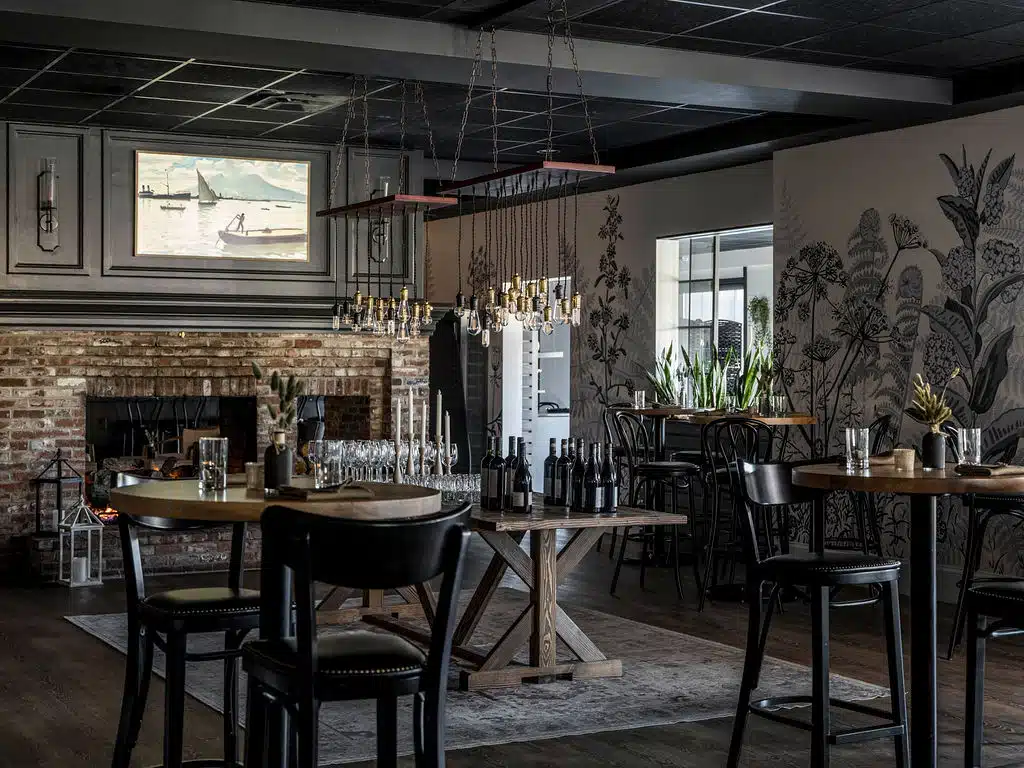
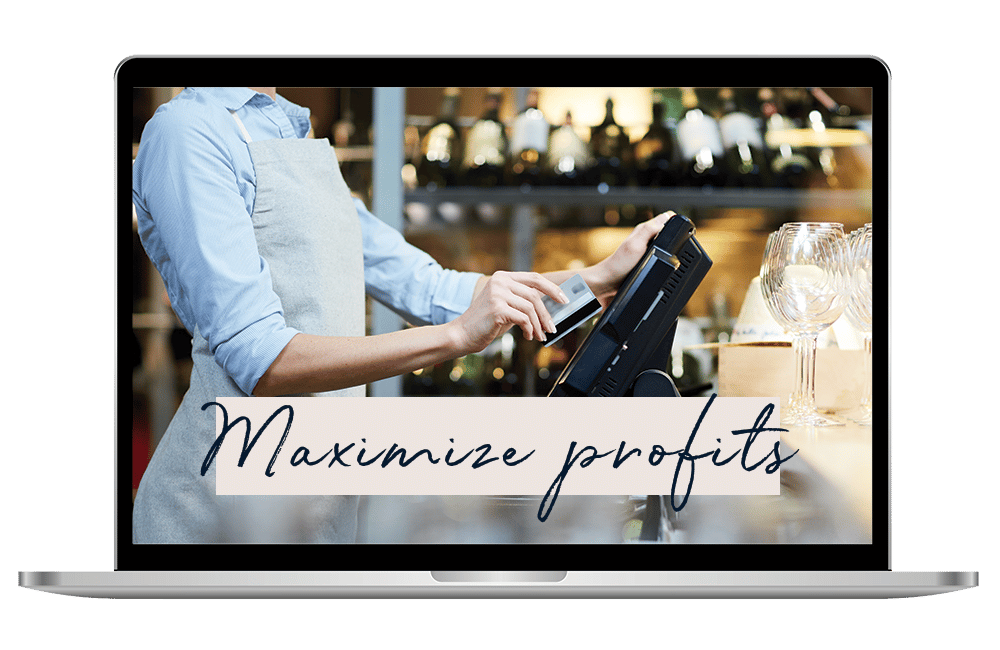
The three costly mistakes you could unknowingly be making?
Find out in this FREE guide and restaurant assessment specifically designed to reveal the unexpected hurdles standing between you and exponential business growth.
Thank You To Our Sponsors

The Employee Retention Tax Credit We will help you determine your eligibility for 2020 & 2021 - Get Started
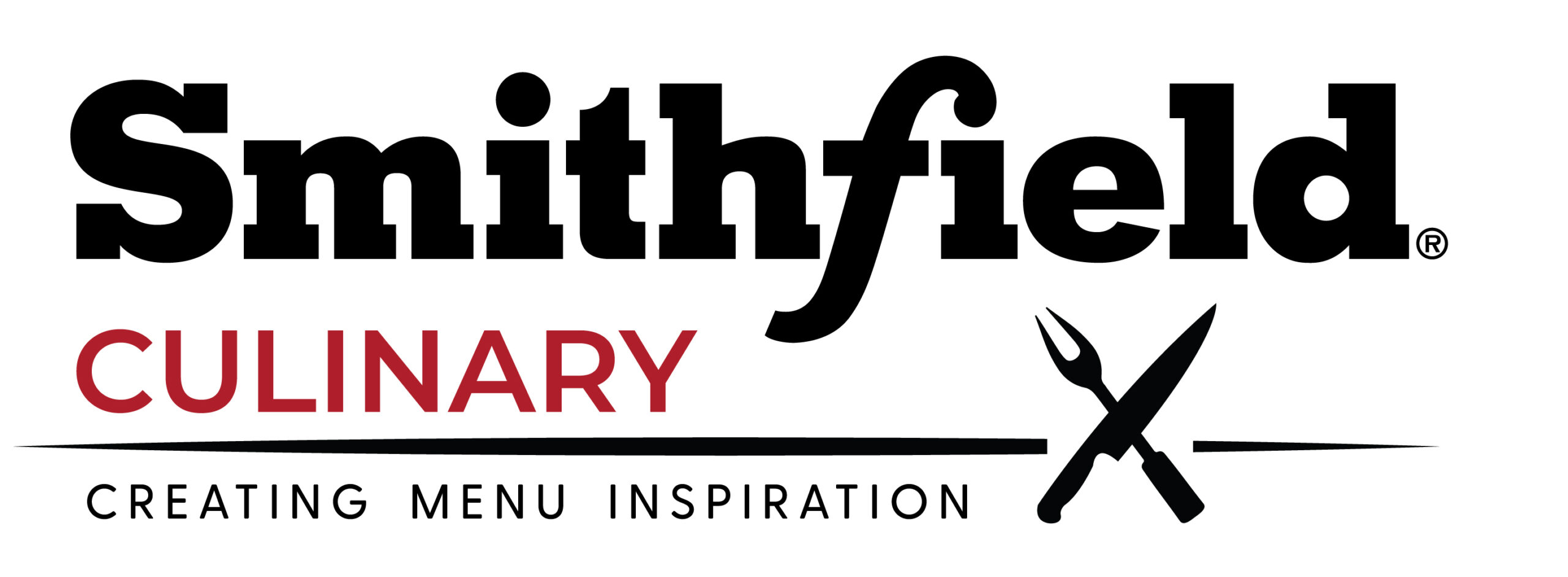
Inspiring Head-Turning Menu Creativity
Culinary Trends & Chef Inspired Recipes - Learn More
Want to become a podcast sponsor?
Please get in touch with Roger at roger@restaurantrockstars.com

